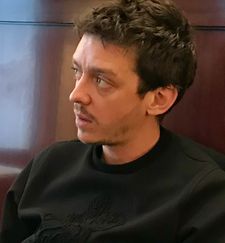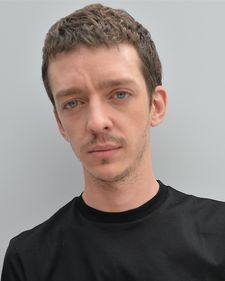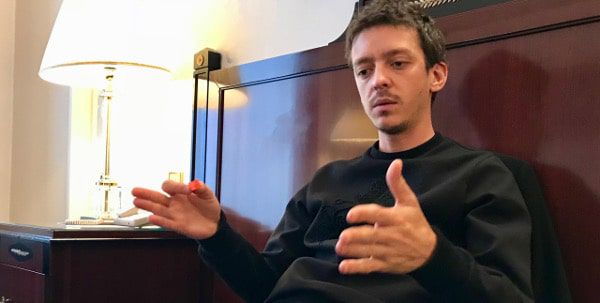Biscayart, 32, who was only four years old at the time of the protest, plays Sean, one of the lead activists who keeps to the fore his own sense of life in the face of the withering effects of AIDS.
The film, against the background of the fight against the pharmaceutical companies and the government to stop withholding the medications that could stop sufferers from dying, has scooped awards aplenty since its Grand Prix at last year’s Cannes Film Festival as well as the international critics’ prize from FIPRESI. Biscayart received accolades in the French César awards - taking the best new actor prize for Campillo’s film and also for Albert Dupontel's See You Up There. He talked in Paris earlier this year about his fast track to acting legitimacy, sexuality, awards and the pink condom.
Richard Mowe: What is your take on all the awards attention?
 |
| Nahuel Pérez Biscayart: 'The work was focused on transmitting to us the energy and the electricity of the time and the tensions of this young generation fighting for their lives' Photo: Unifrance |
RM: In preparation for 120 BPM did you talk to people with AIDS including people who were dying?
NPB: We had the benefit of Robin with his collaborators Philippe Mangeot and Hugues Charbonneau on hand, so everything we had was direct. I talked to some people that I knew that were HIV positive. The process, though, was rather more organic. I am very chaotic when I work. I do not have any method. We also had books to read and to watch documentaries and we had access to French Television’s national archives. There was one great documentary called Silverlake Life: The View from Here, a raw documentary. I had also seen Cyril Collard’s film Savage Nights (Les Nuits Fauves), which was one of the first fiction films to deal with the subject of AIDS. We were, however, doing a fiction and I did not feel I wanted to watch all the fictions about AIDS because even if you wanted to, you would not be able to use all those influences. I prefer a digestive process where you absorb everything and use what you need to rather than comparing your fiction with somebody else’s fiction.
RM: Did you know about the Act Up movement previously?
NPB: No not really - after all I was living in Argentina and I belonged to a different generation. I know that my generation living in Paris knew about the pink condom [this was one of the stunts of ACT UP who on 1 December, 1993, placed a giant fluorescent pink condom on the obelisk at the Place de la Concorde]. I was born in Buenos Aires so at that time I was four or five years old.
RM: Was there a similar movement in Argentina?
 |
| Nahuel Pérez Biscayart: 'I like doing things with people I admire …” Photo: Richard Mowe |
RM: Did you start out as an actor in Buenos Aires - and what brought you to Paris?
NPB: Yes I was working as an actor and doing a bit of everything. But I came to Paris because of a crazy director called Benoît Jacquot, who was looking for an actor for his film Deep In The Woods. I had had an Argentinian film that was screened in Cannes and then released in Paris. He saw the film and then he offered me this part. I was living at that time in New York so I came very accidentally to France. I am only in Paris at the moment because of the promotion of the film, but otherwise I am not based anywhere. I like to keep on the move. I have done films in Spain and Germany - I am on the move all the time.
RM: How do you react to carrying out your promotional duties?
NPB: It is something you have to do. Some actors are great at doing that. I like it a little bit at the beginning because it allows you to discover your film and to listen to other people like you talking about it. At a certain point it becomes very repetitive and it is hard to keep up the same level of spontaneity. I do it with pleasure, though, for this film because I am proud of it. We all are.
RM: Was the character of Sean shaped towards you?
 |
| Nahuel Pérez Biscayart: 'I prefer a digestive process where you absorb everything and use what you need to rather than comparing your fiction with somebody else’s fiction' Photo: Unifrance |
RM: How did you cope with the intimate scenes?
NPB: What was most difficult about those scenes was that they were not only sex scenes. Those kind of scenes can be a bit weird because you can be shy and it is unusual in those circumstances to be surrounded by 20 or so people on the crew. In the end though you know what it is and you can forget. The scenes in this film were very particular because if you remember, in the first scene it is not very performative - we start talking then there is a condom and there are the pills. There is this intimacy that opens up with the characters. It is an intimate encounter in which they can show their weaknesses.
In the debates, everything was very driven by politics and by what to do before the eyes of society. That first scene was very complex in that sense and we had to choreograph a lot because of the camera and due to the fact that the light was very dimmed. Some other characters also appear. There were many things which you do not see when you watch the film but which were very well structured. I like structure when it allows you to be free and you can inhabit the space. We found positions that worked well for the camera and for us and for the light. With the second sex scene at the hospital I always forget it was a sex scene - it was much more than just a physical jerk-off but was very emotional about holding on to life through sex. People came up to me and said they were crying which is great because it speaks to the multi-layer nature of the scene and the first time anyone has cried to me jerking off.
RM: Can you explain why the film has made such an impact today - and to your generation?
NPB: I think it is because it connects to so many different people. That is impressive. I thought it might just talk to people who lived through that time in a very intimate way. Then, of course, there was the other side of society who at the time were looking away, and who now have the opportunity to see what was going on. You always condemn people when you are afraid. Then when times go by you are more open and vulnerable to empathise with something in the past that you did not want to know about. We consider them as heroes but back then they were despised by many people because they were being radical.
For young people, they see this whole movement of guys and girls fighting for their lives in a very human and connected way and I think that is inspiring for this generation who are so used to being behind their screens all the time. This group in the film could be together and define themselves in a very clumsy and yet fragile way. Today we are always thinking about the image and how you present yourself to the world - at that time they were all just out there and doing crazy stuff. The purpose was more important than the shape or the form. They were spreading out their energy in a very free way whereas today young people are much more controlling about their image. They admire those brave people and feel inspired. Taboos are being broken down and things are changing so quickly all the time even for the generation behind me - and I am not very old! They don’t care about definitions of sexuality and gender.
RM: How much weight did you use for the role?
NPB: Yes that was a tough part: I was on a very strict diet for around 20 days. I lost around seven kilograms so I was very weak - and grumpy! I was losing weight during the shooting. I had a little soup at night, but there were no carbs or sugar. I really felt weak.
RM: Has the film opened more possibilities for you as an actor?
NPB: I am getting more scripts. I have not accepted any of them because they don’t appeal to me, but it is great because you have more freedom of choice. I approach acting in the same way but life changes the way I work.
RM: You spent a formative time in New York working with the Wooster Group. How important was it?
 |
| Nahuel Perez Biscayart: 'I am fairly discriminating about my choices - I try to be as honest as I can when I choose' Photo: Unifrance |
RM: How did you fall in to this line of work?
NPB: By accident - or perhaps by need. I was in a high school that was very structured, very sad and very grey. It was a technical and industrial school. I was working on metal when I was aged 14. It was perfect school for formatting people for the job market. There was this theatre group every Friday after the school closed and I found that finally we got to connect to each other through performance. I can tell now that this was the only moment we were creative - connecting with each other rather than completing against each other. I did that for three years. Then I went to a different college to study fine arts and graduating from there I was offered some small theatre roles and it took off from there. I like doing things with people I admire - and there are projects in Mexico and Brazil. Who knows what will happen. I am fairly discriminating about my choices - I try to be as honest as I can when I choose. Would I do a film just for money? Probably not but it depends on how much money and the film. We live in a very perverse system where we need money to live. That is not my main goal. I like it when a director sees something in me that I have not seen myself.
- Read our interview with Robin Campillo about writing from the heart for 120 Beats Per Minute here
Richard Mowe talked to Nahuel Pérez Biscayart at the Unifrance Rendez-vous with French Cinema. The interview took place at the Intercontinental Grand Hotel.
120 Beats Per Minute is released in the UK and Ireland on April 6 by Curzon Artificial Eye / Poland May 11.
Silverlake Life: The View from Here is screening at Flare 2018






















